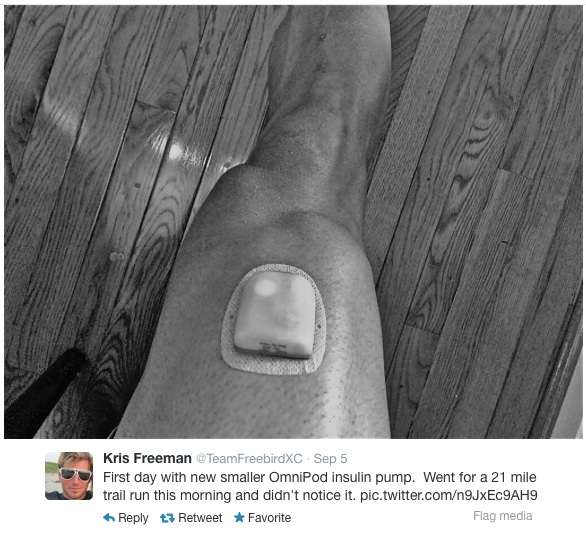VIDEO: Kris Freeman on NBC's Olympic Zone
This piece begins with host Sibila Vargas saying, "For American cross country skier Kris Freeman, Sochi represents his fourth career Olympics where he'll not be only representing the United States, but also diabetic athletes everywhere."
Immediately after Sibila finished, Arden exclaimed, "That's me!"
Originally aired on NBC's 'The Olympic Zone', Feb 10, 2014 - Channel 4 NY
After the interview, Arden told us that she shared with her class today that she knew someone who was competing in the Olympics. Arden explained to her friends that the man she knew had type I diabetes and that he wore the same insulin pump and CGM as she.
I can't thank Kris enough for the example that he is setting for my daughter, and for everyone whose life is touched by type I diabetes. If I had a gold medal Kris... I'd give it to you.
Thank you to NBC for this interview, it means so much... to so many.
Worried your child is too lean for an insulin pump or CGM
I saw this picture on four time Olympian Kris Freeman's twitter feed this weekend and smiled. It instantly caused me to remember the days that I spent worrying that Arden was too lean to wear an OmniPod insulin pump and Dexcom continuous glucose monitor (CGM).
Apparently, that was time that I could have spent on other concerns...
Photo by Kris Freeman. Used with permission. Also pictured, Kikkan Randall.
I met Kris last year at the Lilly Diabetes blogger summit so I sent him an email to ask if I could use his picture on Arden's Day. I told him that I wanted to illustrate to all of the concerned parents that their children aren't too lean to wear these devices. I've admittedly had that concern in the past, and it is one of the most often asked question when I hear from parents like you.
In my opinion Kris's body is an extreme example and thus why I wanted to show you his picture. Being lean doesn't mean that a person can't use an insulin pump or CGM, even if that person has almost no body fat. Kris told me that he can hit a muscle because of how lean he is, but that it is, "worth it" to be able to use the devices. It is my finding that Arden has plenty of body fat even at just over fifty pounds and in five years we've never hit a muscle.
My child is so active, I'm worried that a pump will get in the way.
The other concern that I hear most from parents who are considering an insulin pump or CGM, that their child plays a competitive sport and they worry that the devices will be an impediment. If you've ever had that concern, please take a look at this next picture from Kris's Twitter feed... Be sure to read the caption to put that concern out of your mind.
"Went for a 21 mile trail run..."
Kris is competing in Sochi with an insulin pump and a CGM, I watched his first event yesterday and it's safe to say that he is an inspiration to any person who lives with type I diabetes. Watching Kris ski makes me even more certain that Arden will be able to reach for whatever dream she can imagine. Knowing that he endures such physical rigors while managing his BGs is a great comfort to me, and I hope to all of you.
I'll be speaking with Kris again soon and reporting back. In the meantime here's a list of his remaining events in Sochi.
Good luck Kris, we are all cheering for you... I'm off to do a sit up.
Don't Miss Kris Freeman in Sochi
I have a picture of Kris and I together but I won't share it because he is like 9,000 times more handsome than I am.
Olympic cross country skier, Kris Freeman will be going for the gold in Sochi while wearing his OmniPod insulin pump - Here are the times and dates that you can catch him on your television. Times are EST.
- February 9th - Men's Skiathlon 30 km (starting 2pm)
- February 14th - Men's 15 km Classic (starting 5:30am)
- UPDATE: Kris announces he is probably done skiing at Sochi games
- February 16th - Men's 4x10 km Relay (starting 7pm)
- February 23rd - Men's 50 km (starting 2pm)
Kris provides an excellent example for people living with type I and I can't wait to sit down with Arden and watch him compete.
Kris wrote a guest post about the Olympics, for LillyPad, that you can find here.
“I will compete in the first of four races at the 2014 Olympics. Each time I will think of the thousands of children I’ve met over the last 10 years and try to win a medal for all of us.”
Type I Diabetes CURED (In mice)
Dear Scientists,
I know that it must be difficult to find research money for your study and I understand that you are under pressure to generate excitement about your work.
I'm also extremely grateful to anyone who is trying to find a cure for type I diabetes. I don't want you to stop looking or collecting grants and donors, but I do need you to do one small favor for me, well, actually for everyone who is touched by type I diabetes.
STOP publishing your "exciting" news about curing lab mice!
You see, when I open my laptop and read your story about how you coaxed a cell into producing insulin, I shrug and go about my business because my daughter has been living with diabetes for a very long time and I've seen a thousand articles just like yours. I know not to get excited - I know that you're fishing for donors. I understand that you are trying to justify the space that you take up in some lab. I get what the price of doing business is, I empathize.
But how about having some compassion for the countless families who are new to type I diabetes, maybe you shouldn't be getting their hopes up just to break their hearts all over again. Maybe, you should just shut up until you figure out a way to help a person. These stories hurt people. Parents, adults, friends and family. People are crushed when you lift them so high, only to drop them down onto their reality. The next time I hear you talk about a mouse, it better be because you figured out how to use that "cure" you found in a person. We have feelings, consider them.
Study: Effects of Type I Diabetes on a Young Child's Brain
I'm posting chunks from a recent study that can be found on Diabetes Care (American Diabetes Association) and blurbs from a corresponding article about the study, from Reuters Health. Study text is in the left column, Reuters on the right.
I don't believe that this information should lead you to more worry (Though it likely will) but I do believe that the parents of young children, who live with type I diabetes, should be aware of the study findings. These articles are not fun to read for many reasons, but I found them to be full of the kind of information that helps me to (hopefully) avoid long-term complications for Arden.
If you are currently struggling with BGs or generally feeling down about type I - seriously - bookmark this and save it for a better day - even though you'll likely not find much of the information surprising, it is a somber reminder. My thoughts, are as always, with you and your families. - Scott
Links to the complete articles are included below, at the end of each column.
“While many children may not show overt complications from these differences in neural structure, some do have difficulties with processing speed, memory, learning, and complex cognitive functions”
Alterations in White Matter Structure in Young Children With Type 1 Diabetes
Study Objective: To investigate whether type 1 diabetes affects white matter (WM) structure in a large sample of young children.
Results: Between-group analysis showed that children with type 1 diabetes had significantly reduced axial diffusivity (AD) in widespread brain regions compared with control subjects. Within the type 1 diabetes group, earlier onset of diabetes was associated with increased radial diffusivity (RD) and longer duration was associated with reduced AD, reduced RD, and increased fractional anisotropy (FA). In addition, HbA1c values were significantly negatively associated with FA values and were positively associated with RD values in widespread brain regions. Significant associations of AD, RD, and FA were found for CGM measures of hyperglycemia and glucose variability but not for hypoglycemia. Finally, we observed a significant association between WM structure and cognitive ability in children with type 1 diabetes but not in control subjects.
Conclusions: These results suggest vulnerability of the developing brain in young children to effects of type 1 diabetes associated with chronic hyperglycemia and glucose variability.
The entire study can be found here, it includes a significant introduction, an outline of research design and methods, as well as a description of the participants, CGM use in the study, data analysis and much more.
Chronic hyperglycemia, glucose variability may affect children's brains
By Lorraine L. Janeczko
NEW YORK (Reuters Health)
"Chronic hyperglycemia and glucose variability could impact the brains of young children with type 1 diabetes, new research suggests."
"In what the authors call the largest study to date investigating white matter structure in young children with type 1 diabetes, diabetic children had widespread and significant differences in their white matter microstructure compared with nondiabetic controls."
"Compared to controls, children with type 1 diabetes had significantly reduced axial diffusivity (AD) in their frontal, temporal, parietal, and occipital lobes. Earlier diabetes onset was associated with increased radial diffusivity (RD), and longer duration was associated with reduced AD, reduced RD, and increased fractional anisotropy (FA) (all P<0.05)."
"While many children may not show overt complications from these differences in neural structure, some do have difficulties with processing speed, memory, learning, and complex cognitive functions which can be associated with poor neuronal function," she said.
"I believe that these effects could be improved with good glycemic control, although an empirical investigation would help to answer this question. It seems that in the quest to prevent hypoglycemia in children with diabetes, there has been an increase in hyperglycemia in many children. It may be the case that a balance needs to be struck between the two extremes, perhaps with better methods of glucose monitoring."


























